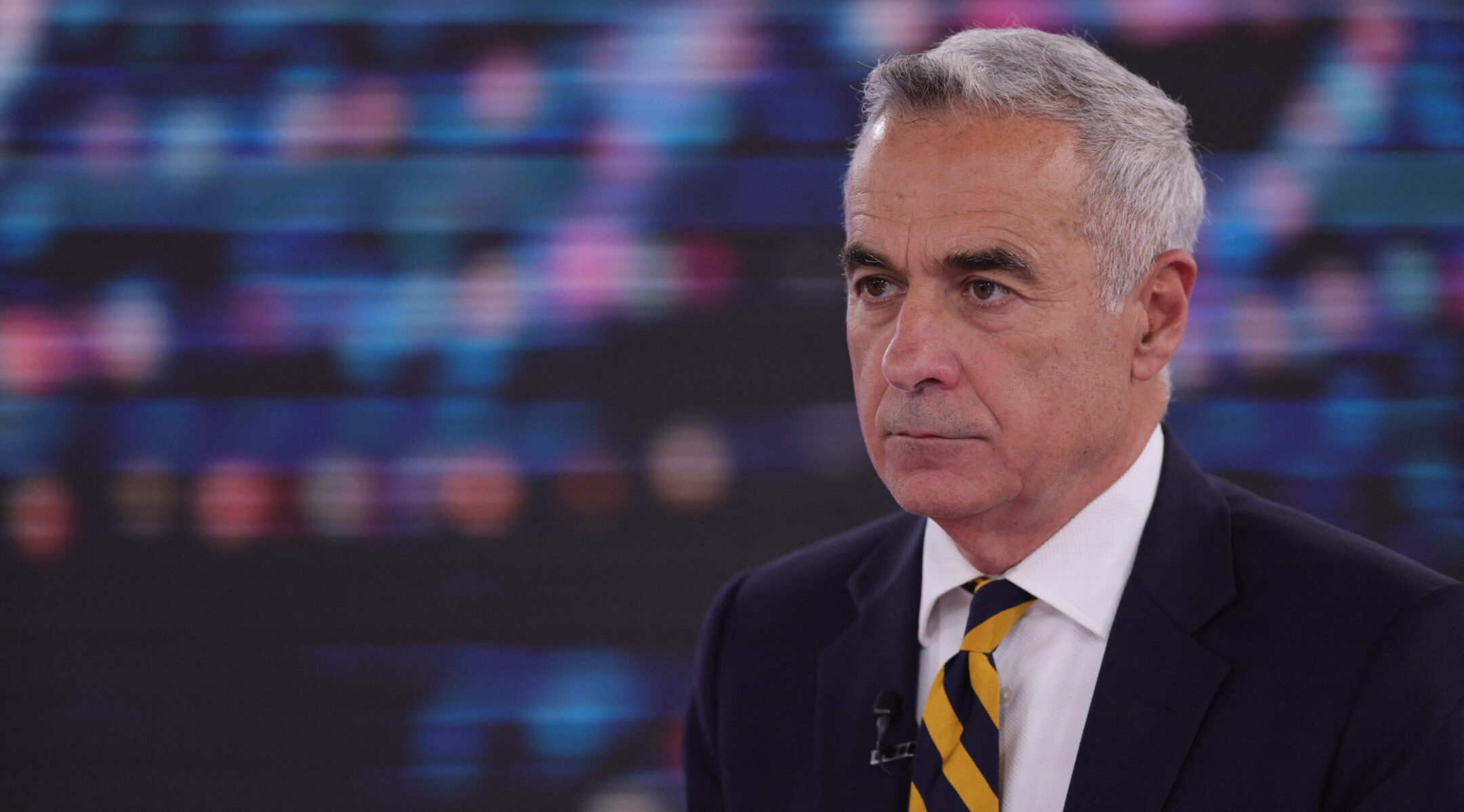Far-right politician who praised Nazi collaborators shocks with top finish in Romanian presidential election
Calin Georgescu now heads to a runoff against a liberal lawmaker

Calin Georgescu at the Romanian tv station “Digi 24” in Bucharest, Romania, Nov. 13, 2024. (Octav Ganea / DIGI24/INQUAM PHOTOS / AFP via Getty Images)
(JTA) — A politician who praised notorious Romanian antisemites and Nazi collaborators has won the first round of his country’s presidential election.
Calin Georgescu ran independently after leaving Romania’s far-right party, Alliance for the Union of Romanians, following his comments and amid accusations that he was pro-Putin. He will now face a liberal reformer, Elena Lasconi, in next week’s runoff; it will be the first election since the end of communism in which Romania’s centrist party is not an option.
Georgescu’s outsized showing — he took home 22% of the vote, far more than the 10% polls had suggested he would win — comes amid a wave of electoral successes for right-wing populists across Europe and beyond. In Germany, a far-right political party won a state election for the first time since the Holocaust this fall; weeks later, a far-right party founded by former Nazis won Austria’s national election.
Geert Wilders, an anti-immigrant right-wing politicians, came in first in the Netherlands’ national election last December, not long after a politician once photographed wearing a Nazi armband won Italy’s election. And the far right in France posted stronger-than-expected results in the country’s surprise elections this summer.
Unlike those parties and politicians, which traded on anti-immigrant and Eurosceptic sentiment, Georgescu — a 62-year-old former soil scientist — did not outline a thorough policy platform during the campaign. He gained attention for his social media posts, particularly on TikTok, the video app accused by lawmakers in the United States and Europe of promoting antisemitism and allowing foreign actors to covertly influence elections.
Georgescu previously went viral with his praise for two fascists who led Romania in the 1930s and ’40s.
Speaking on a primetime news show in February 2022, Georgescu, a sustainability expert formerly affiliated with the United Nations, explained why he had cited Corneliu Zelea Codreanu as a national “hero,” saying Codreanu “fought for the morality of the human being.”
The comment immediately drew widespread condemnation, including from Jewish groups, because Codreanu led the fiercely antisemitic Legionnaire Movement, which espoused an extreme version of ethnic and religious nationalism that involved political murders and acts of terrorism, until his execution in 1938.
Two years later, the group entered the government of Romania’s pro-Nazi dictator Ion Antonescu, where it stayed until the following January, when it mounted a pogrom in the capital of Bucharest in which more than 120 Jews were killed and several synagogues and Jewish businesses were destroyed. The pogrom was intended as an uprising against Antonescu’s government, which the Legionnaire Movement believed was insufficiently aggressive in pursuing a campaign against Romanian Jews.
Georgescu also referred to Antonescu, under whose rule at least 280,000 Jews were killed and who was executed in 1946 for war crimes, as a “martyr.”
His opponent Lasconi, a former journalist, ran on an anti-corruption platform but also holds some socially conservative views on topics including marriage. Lasconi’s daughter, Oana, is an anti-Zionist activist who posted a photo on Instagram hugging and kissing her mother while wearing a keffiyeh, a traditional Palestinian headscarf, in the run-up to the first-round elections. If she wins she would become the first female president in the country’s history.
There are around 8,900 Jews currently living in Romania, according to the World Jewish Congress. Romanians head to the polls again on Dec. 8 for the runoff.
A message from our Publisher & CEO Rachel Fishman Feddersen

I hope you appreciated this article. Before you go, I’d like to ask you to please support the Forward’s award-winning, nonprofit journalism so that we can be prepared for whatever news 2025 brings.
At a time when other newsrooms are closing or cutting back, the Forward has removed its paywall and invested additional resources to report on the ground from Israel and around the U.S. on the impact of the war, rising antisemitism and polarized discourse.
Readers like you make it all possible. Support our work by becoming a Forward Member and connect with our journalism and your community.
— Rachel Fishman Feddersen, Publisher and CEO


























